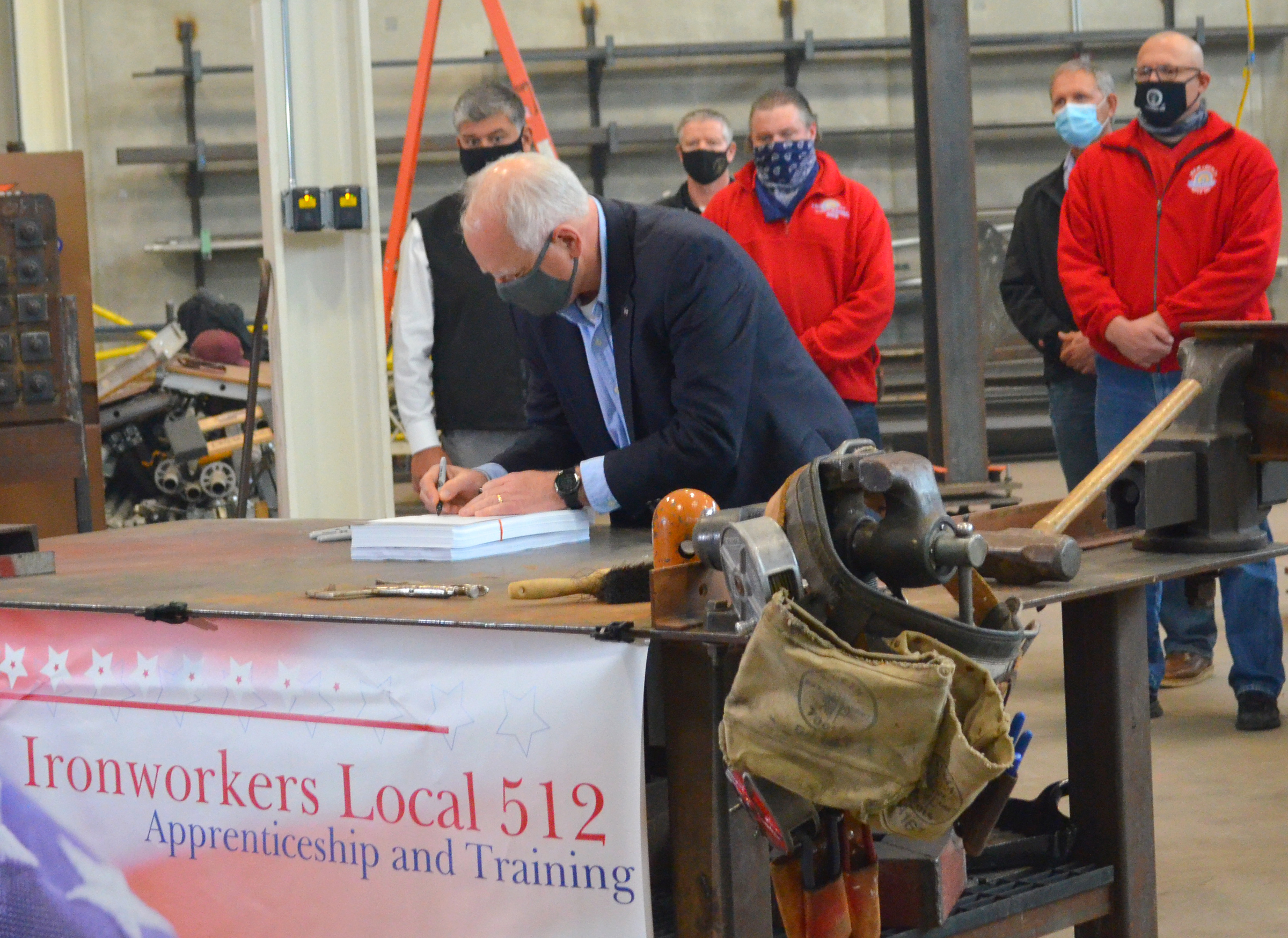
Gov. Walz signs a $1.88 package of infrastructure investments into law.

Share
In a ceremony held on the floor of Ironworkers Local 512’s apprenticeship training center today, Gov. Tim Walz signed into law a $1.88 billion package of infrastructure investments that will create thousands of jobs for union tradespeople across Minnesota.
The bill also keeps open the Willow River and Togo correctional facilities, a top priority of the state’s largest public service union, AFSCME Council 5. And it provides a long-sought emergency rate increase for the state’s home care workers, members of SEIU Healthcare Minnesota.
The measure passed both chambers of the Legislature during a special session last week, drawing bipartisan support.
The largest bonding bill in state history will fund local projects in both the metro and greater Minnesota, including transportation infrastructure, affordable housing and water-treatment and higher-education facilities.
Walz likened the projects to the property improvements homeowners might make, but on a much larger scale. “It’s the most important investment you make,” he said. “You don’t let it run down.”
The governor also thanked the Minnesota Building and Construction Trades Council and its member unions for convincing enough legislators to support such a robust bonding package.
“They did the hard work of getting this thing across the finish line,” Walz said. “And now they’ll do the actual work” of building and repairing the state’s buildings, roads, bridges, water systems and more.
Bonding is traditionally a legislative priority in even-numbered years, and lawmakers were progressing steadily toward a bill during the regular session – until the COVID-19 pandemic derailed their progress.
Since the regular session adjourned in May, Walz has called lawmakers into special session each month. But until last week members of the House Republican caucus withheld their support for the jobs-creating infrastructure bill, hoping to pressure Walz into giving up his emergency powers during the pandemic.
Barry Davies, Local 512’s business manager, noted that tradespeople would still be waiting for an infrastructure investment had 25 House Republicans not broke with their caucus’ leadership to support the bill last week.
“Today, when Gov. Walz signs this bill, we really, truly are one Minnesota,” Davies said.
Bonding bills sustain jobs in the construction industry, added Operating Engineers Local 49Business Manager Jason George.
“We needed this bill,” George said. “The global pandemic has created economic uncertainty for next year, and this bill eliminates a lot of that uncertainty for our work in Minnesota.”
“This bonding investment is necessary for our communities, workers and our economy,” said Jessica Looman, executive director of the Minnesota Building Trades Council. “Construction workers across the state are breathing a little easier today, knowing that there will be jobs coming so they can keep working to provide for themselves and their families.”
The emergency rate increase for home care, meanwhile, came after home care clients and workers, members of SEIU Healthcare Minnesota, staged rallies in the streets outside the Capitol in the days leading up to the special session.
The rate increase rewards workers on the front lines of the pandemic response, providing care that helps tens of thousands of Minnesota seniors and people with disabilities live safely in their homes.
The home health industry suffers from a critical shortage of workers, and SEIU members and their clients have been campaigning for years to improve pay and benefits to make the job more attractive.
Robin Pikala, a home care worker and SEIU member from Fridley, called the bipartisan vote “an important step,” toward the respect workers and clients deserve.
“But this temporary support during the peacetime emergency is just a stopgap,” Pikala added. “We have so much work left to do.”
The special session wrapped up Oct. 15, less than a month before Election Day. Every seat in the Legislature is up for election in 2020.

